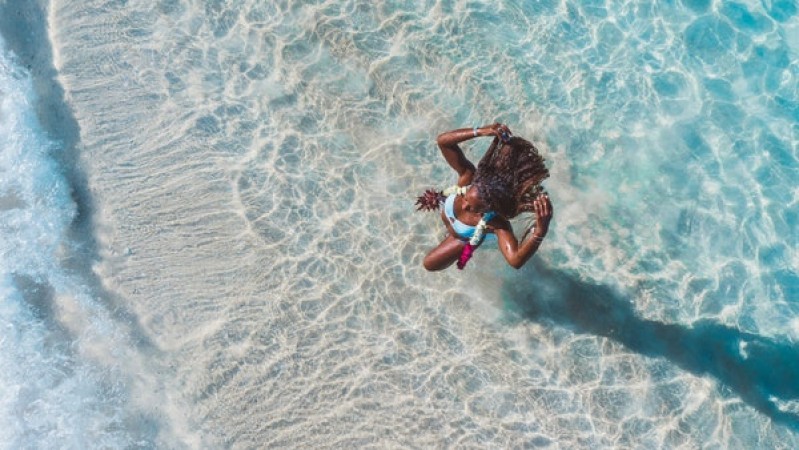
Spending a day at the beach is always refreshing. The salty breeze, the crashing waves, and the warm sun make for a perfect outing. But, have you ever wondered why it's essential to take a shower after swimming in the sea? Let's dive into the reasons behind this common advice.
Sea Salt Benefits and Drawbacks
While sea salt has some skin benefits, such as exfoliation and antibacterial properties, it can also be detrimental if left on the skin for too long. The salt can dry out your skin, leading to itchiness and irritation.
Salt Crystals and Skin Irritation
Salt crystals left on the skin can cause microscopic abrasions. This can make your skin feel rough and uncomfortable, especially if you have sensitive skin.
Microscopic Organisms
The ocean is home to countless microorganisms, some of which can adhere to your skin and cause infections or rashes. These can include bacteria, algae, and even small jellyfish larvae.
Algae and Its Effects
Algae can leave a slimy residue on your skin, which might not only feel unpleasant but also lead to skin irritation.
Chemical Contaminants
Despite efforts to keep beaches clean, the ocean can still contain pollutants like oils, chemicals, and waste materials. These substances can be harmful if they remain on your skin for extended periods.
Plastics and Microplastics
Microplastics are tiny particles that come from larger plastic debris broken down by the elements. These particles can stick to your skin and pose potential health risks.
Preventing Dryness
A quick rinse after your swim washes away the salt, preventing it from drying out your skin. Moisture is key to maintaining healthy, supple skin.
Comfort and Cleanliness
Removing sand and other debris ensures you feel clean and comfortable, avoiding the gritty feeling that can linger after a day at the beach.
Preventing Infections
By washing off bacteria and other microorganisms, you reduce the risk of developing skin infections. This is particularly important for those with cuts or abrasions, which can easily become infected.
Avoiding Rashes
Some people are sensitive to certain types of sea life, like jellyfish or certain algae. Rinsing off thoroughly helps to remove any irritants that could cause a rash.
Dry and Brittle Hair
Salt water can strip your hair of its natural oils, leaving it dry and brittle. A good rinse helps to restore moisture and prevent damage.
Tangled Tresses
The combination of salt and sand can lead to tangled hair. Washing your hair helps to detangle and smooth it out, making it easier to manage.
Removing Residue
Salt and other debris can build up on your scalp, leading to dandruff and irritation. A thorough wash ensures your scalp stays healthy and clean.
Preventing Itchiness
A clean scalp is less likely to be itchy and uncomfortable, allowing you to enjoy your beach day without any lingering discomfort.
Fresh Water Rinse
Always use fresh water to rinse off after swimming in the sea. This effectively removes salt, sand, and other residues from your skin and hair.
Mild Soap or Body Wash
Opt for a gentle soap or body wash to cleanse your skin without stripping it of its natural oils. This helps to maintain the moisture balance of your skin.
Conditioner and Hydration
Use a hydrating conditioner to restore moisture to your hair. If your hair feels particularly dry, consider using a leave-in conditioner or hair mask for extra hydration.
Eco-Friendly Products
When rinsing off at the beach, use eco-friendly products that won't harm the marine environment. Avoid products with harmful chemicals that can wash back into the ocean.
Using Public Facilities
Many beaches have public showers available. Take advantage of these facilities to rinse off before heading home, ensuring you leave the beach clean and comfortable.
Mindful Water Use
Be mindful of water conservation. Use only as much water as you need to rinse off thoroughly, and encourage others to do the same.
Reality: Partial Truth
While sea water can cleanse superficially due to its salt content, it also leaves behind residues and microorganisms that can be harmful. A proper rinse with fresh water is essential for thorough cleanliness.
Reality: Thorough Rinse Needed
A quick rinse might not remove all the salt, sand, and microorganisms. Take the time to wash thoroughly to ensure all residues are removed.
Replenishing Moisture
After rinsing off, apply a good moisturizer to your skin to replenish any lost moisture. This helps to prevent dryness and keep your skin feeling soft and smooth.
Drinking Water
Stay hydrated by drinking plenty of water. This helps your skin stay moisturized from the inside out, complementing your external skincare routine. Showering after a dip in the ocean is not just about feeling fresh; it's a crucial step to maintaining your skin and hair health. By washing away salt, sand, and potential pollutants, you ensure that your beach day ends on a clean, comfortable note. So next time you enjoy the waves, remember to rinse off and enjoy the lasting benefits of a thorough post-sea shower.
National Wine Day 2024: Does Moderate Drinking Really Have Health Benefits?
Excessive use of earphones is not without danger! Avoid infection like this
How to Handle Frequent Nail Breakage: Don't Ignore It, as It Could Indicate a Serious Issue